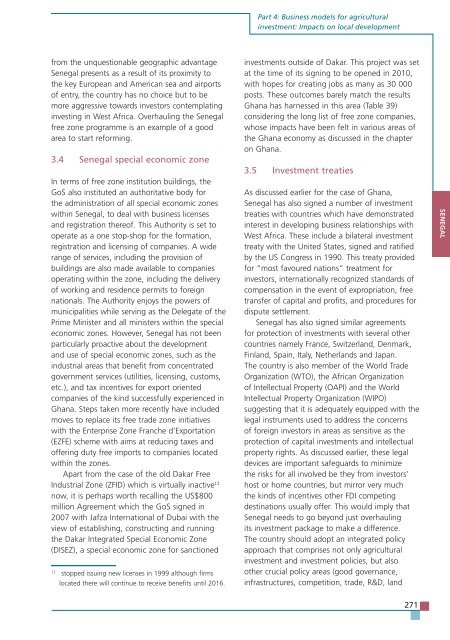TRENDS AND IMPACTS OF FOREIGN INVESTMENT IN DEVELOPING COUNTRY AGRICULTURE
TRENDS AND IMPACTS OF FOREIGN INVESTMENT IN DEVELOPING COUNTRY AGRICULTURE
TRENDS AND IMPACTS OF FOREIGN INVESTMENT IN DEVELOPING COUNTRY AGRICULTURE
You also want an ePaper? Increase the reach of your titles
YUMPU automatically turns print PDFs into web optimized ePapers that Google loves.
from the unquestionable geographic advantage<br />
Senegal presents as a result of its proximity to<br />
the key European and American sea and airports<br />
of entry, the country has no choice but to be<br />
more aggressive towards investors contemplating<br />
investing in West Africa. Overhauling the Senegal<br />
free zone programme is an example of a good<br />
area to start reforming.<br />
3.4 Senegal special economic zone<br />
In terms of free zone institution buildings, the<br />
GoS also instituted an authoritative body for<br />
the administration of all special economic zones<br />
within Senegal, to deal with business licenses<br />
and registration thereof. This Authority is set to<br />
operate as a one stop-shop for the formation,<br />
registration and licensing of companies. A wide<br />
range of services, including the provision of<br />
buildings are also made available to companies<br />
operating within the zone, including the delivery<br />
of working and residence permits to foreign<br />
nationals. The Authority enjoys the powers of<br />
municipalities while serving as the Delegate of the<br />
Prime Minister and all ministers within the special<br />
economic zones. However, Senegal has not been<br />
particularly proactive about the development<br />
and use of special economic zones, such as the<br />
industrial areas that benefit from concentrated<br />
government services (utilities, licensing, customs,<br />
etc.), and tax incentives for export oriented<br />
companies of the kind successfully experienced in<br />
Ghana. Steps taken more recently have included<br />
moves to replace its free trade zone initiatives<br />
with the Enterprise Zone Franche d’Exportation<br />
(EZFE) scheme with aims at reducing taxes and<br />
offering duty free imports to companies located<br />
within the zones.<br />
Apart from the case of the old Dakar Free<br />
Industrial Zone (ZFID) which is virtually inactive 12<br />
now, it is perhaps worth recalling the US$800<br />
million Agreement which the GoS signed in<br />
2007 with Jafza International of Dubai with the<br />
view of establishing, constructing and running<br />
the Dakar Integrated Special Economic Zone<br />
(DISEZ), a special economic zone for sanctioned<br />
12 stopped issuing new licenses in 1999 although firms<br />
located there will continue to receive benefits until 2016.<br />
Part 4: Business models for agricultural<br />
investment: Impacts on local development<br />
investments outside of Dakar. This project was set<br />
at the time of its signing to be opened in 2010,<br />
with hopes for creating jobs as many as 30 000<br />
posts. These outcomes barely match the results<br />
Ghana has harnessed in this area (Table 39)<br />
considering the long list of free zone companies,<br />
whose impacts have been felt in various areas of<br />
the Ghana economy as discussed in the chapter<br />
on Ghana.<br />
3.5 Investment treaties<br />
As discussed earlier for the case of Ghana,<br />
Senegal has also signed a number of investment<br />
treaties with countries which have demonstrated<br />
interest in developing business relationships with<br />
West Africa. These include a bilateral investment<br />
treaty with the United States, signed and ratified<br />
by the US Congress in 1990. This treaty provided<br />
for “most favoured nations” treatment for<br />
investors, internationally recognized standards of<br />
compensation in the event of expropriation, free<br />
transfer of capital and profits, and procedures for<br />
dispute settlement.<br />
Senegal has also signed similar agreements<br />
for protection of investments with several other<br />
countries namely France, Switzerland, Denmark,<br />
Finland, Spain, Italy, Netherlands and Japan.<br />
The country is also member of the World Trade<br />
Organization (WTO), the African Organization<br />
of Intellectual Property (OAPI) and the World<br />
Intellectual Property Organization (WIPO)<br />
suggesting that it is adequately equipped with the<br />
legal instruments used to address the concerns<br />
of foreign investors in areas as sensitive as the<br />
protection of capital investments and intellectual<br />
property rights. As discussed earlier, these legal<br />
devices are important safeguards to minimize<br />
the risks for all involved be they from investors’<br />
host or home countries, but mirror very much<br />
the kinds of incentives other FDI competing<br />
destinations usually offer. This would imply that<br />
Senegal needs to go beyond just overhauling<br />
its investment package to make a difference.<br />
The country should adopt an integrated policy<br />
approach that comprises not only agricultural<br />
investment and investment policies, but also<br />
other crucial policy areas (good governance,<br />
infrastructures, competition, trade, R&D, land<br />
271<br />
SENEGAL


